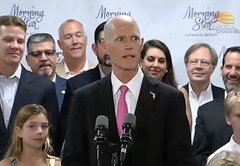Expand school options for parents
Rick Scott
"I want to offer parents a menu of options for their children, including but not limited to charter schools, private schools, homeschooling and virtual schools. I want to create an educational program that will allow parents to get creative in how to meet the distinctive needs of their children."
Scott-O-Meter
Promise Kept

